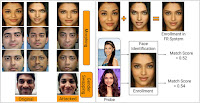IEEE 2023: Enhancing Facial Image Forgery Detection through Transfer Learning-Based Classification
Abstract : In today's world, digital images have become ubiquitous, adorning the screens of our smartphones and populating the web pages of online platforms. Their applications span across numerous industries, including media, forensic and criminal investigations, medicine, and more. However, the accessibility and widespread usage of consumer photo editing tools have made image alteration effortless. This poses significant risks and challenges, particularly in fields where image integrity is paramount, making it exceedingly difficult to authenticate and establish the credibility of digital images.
Digital picture forgery involves manipulating an image's meaning by tampering with its content without leaving discernible traces. This study focuses on the classification of facial image forgeries using transfer learning techniques, specifically employing Convolutional Neural Networks (CNN) techniques. Three transfer learning methods, namely VGG-19, Inception V3, and Dense Net 201, are demonstrated to detect and classify facial image forgeries accurately.
Abstract : This study proposes a novel approach for detecting cardiovascular diseases (CVD) from electrocardiogram (ECG) imagery using Convolutional Neural Networks (CNNs) and transfer learning techniques. Leveraging the pre-trained models Inception V3 and DenseNet201, we aim to overcome limitations posed by small datasets in medical imaging. Our methodology involves fine-tuning these architectures on a custom dataset of ECG images to adapt them to the task of CVD detection. By transferring knowledge learned from large-scale image datasets, our models achieve superior performance in terms of accuracy and generalization. Through extensive experiments and evaluation, we demonstrate the effectiveness of our approach in accurately diagnosing various cardiovascular conditions. This research contributes to the advancement of computer-aided diagnosis systems for CVDs, providing a scalable and efficient solution for early detection and intervention. Our implementation in Python facilitates easy integration into existing healthcare systems.
IEEE 2023: Harnessing Audio for Avian Identification: A Review of Bird Species Identification Techniques.
Abstract : This project aims to advance avian identification through the utilization of audio signals, employing a comprehensive approach that integrates with deep learning techniques. The study focuses on developing three distinct models: Ridge Classifier, Support Vector Machine (SVM) Classifier, and Artificial Neural Network (ANN). By converting audio signals into numerical data using standard Python libraries, we aim to create robust models capable of accurately identifying bird species based on their distinct audio signatures. The Ridge and SVM classifiers, representing classical ML paradigms, will leverage advanced feature extraction methodologies. Simultaneously, the ANN model, a deep learning approach, will harness the power of neural networks to capture intricate patterns within the audio data. This interdisciplinary fusion of ML and deep learning techniques is poised to significantly enhance avian species identification, contributing to biodiversity monitoring and conservation efforts.
IEEE 2023: ISR-GAN: Improved Super-Resolution based GAN to Resolve Low Resolution Text Images
Abstract : The rapid advancement of Generative Adversarial Networks (GANs) has paved the way for significant breakthroughs in image processing tasks, particularly in the domain of super-resolution. In this proposal, we introduce ISR-GAN (Improved Super-Resolution based GAN), a novel framework tailored specifically for enhancing low-resolution text images. Our aim is to address the challenges associated with resolving degraded text content, where traditional methods often struggle due to the intricate details and sharp edges characteristic of text. By leveraging the adversarial training mechanism of GANs, coupled with advanced super-resolution techniques, ISR-GAN aims to produce high-fidelity, visually appealing reconstructions of low-resolution text images. We propose to employ carefully designed network architecture, incorporating both perceptual and adversarial loss functions, to encourage the generation of text images that not only exhibit enhanced resolution but also preserve textual content and clarity. Through extensive experimentation and evaluation, we seek to demonstrate the effectiveness and superiority of ISR-GAN over existing methods, offering a promising solution for improving the quality and readability of low-resolution text images.







No comments:
Post a Comment